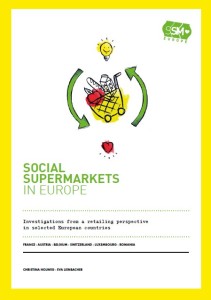Social supermarkets are comparable to conventional supermarkets that operate in stationary outlets and primarily sell food and consumer products. The main difference of SSMs as compared to conventional supermarkets lies in a modified implementation of various retail marketing mix instruments, for example, a limited assortment and a significantly lower consumer price of approximately 50% to 70% less than regular market prices. The target group of SSMs is restricted to financially poor people, and access to the stores is controlled with the help of identification cards that are issued upon the presentation of an income statement. The stores’ limited assortments consist of surplus products that are supplied free of charge by retailing and manufacturing companies. These products are unsellable for various reasons (e.g., they are close to the expiration date, surplus products, in the wrong packaging) but still consumable. Thus, availability of merchandise is limited to what is supplied. The general goals of SSMs are to support financially poor people, prevent the wastage of food, and provide job opportunities for long-term unemployed people. Therefore, SSMs are seen by the European Commission (2010) as a simple and efficient solution beneficial to all stakeholders. The majority of SSMs are run by nonprofit organizations.
In 2011, the Institute of Retailing and Marketing at WU–Vienna University of Economics and Business published the first sector overview of SSMs with a focus on Austria (Lienbacher & Holweg, 2011). The results were published in the International Journal of Non-Profit & Public Sector Marketing in December 2011 (Holweg & Lienbacher, 2011). Presentations at congresses of ECR (Efficient-Consumer-Response) in Europe revealed a strong interest in the concept by leading international retailers as Tesco, Carrefour, or Rewe as well as manufacturers such as Unilever or Nestlé (Holweg & Steiner, 2012; Holweg & Lienbacher, 2011).
In the first enquiries across European countries the authors became aware of similar types of SSMs that already existed in other European countries under a variety of names such as “Épiceries Sociales“ in France, “Sociales Kruideneers“ in Belgium or “Magazinul Social“ in Romania. Nonetheless – despite a remarkable amount of stores investigated across various countries – the authors did not find any relevant publications on the topic, not to mention a lack of publications from a retailing perspective. As such, the objective of the research project was to provide the first comprehensive overview of the situation of SSMs in Europe. The results were published in 2016 in the report „Social Supermarkets in Europe – Investigations from a retailing perspective in selected European countries” (Holweg & Lienbacher, 2016). It covers SSMs in France, Austria, Belgium, Switzerland, Luxembourg, and Romania. This selection was based on the fact that all of these countries feature SSMs that have been active for several years.
“Social supermarkets (SSMs) in Europe” is a research project led by researchers of the Institute for Retailing & Marketing at WU Vienna University of Economics and Business and the Salzburg University of Applied Sciences in Austria. The objective of the project is to provide the first overview of SSMs in Europe.
The report „Social Supermarkets in Europe – Investigations from a retailing perspective in selected European countries (2016)” is available as hard-copy (110 pages) at the cost of €49.90 under handel.marketing@wu.ac.at.
Key References:
- European Commission (2010), “Preparatory study on food waste across EU 27 ,” final report. European Commission in association with AEA Energy, Umwelt Bundesamt and Environment and BIO Intelligence Service.
- Holweg, C., Lienbacher, E. (2016), “Social Supermarkets in Europe – Investigations from a retailing perspective in selected European countries, Vienna: Institute for Retailing and Marketing. ISBN: 978-3-200-04756-3.
- Holweg, C., and E. Lienbacher (2011), “Social Marketing Innovation: New Thinking in Retailing, ” Journal of Nonprofit & Public Sector Marketing, 23 (4), 307-326.
- Lienbacher, E., and C. Holweg (2011), “Strukturanalyse Sozialmärkte in Österreich,” in Schriftenreihe Handel und Marketing, Vol 74, P. Schnedlitz, Peter, ed. Vienna: Institute for Retailing and Marketing.
- Holweg, C., and E. Lienbacher (2011), Sozialmärkte aus Handelsperspektive. Facts und Figures der ersten Retail-Gesamtstudie in Österreich,” presentation at the 2011 ECR-Austria Infotag, Vienna (Nov. 16).
- Holweg, C., and G. Steiner, (2012), “Profit by working together to prevent supply chain waste,” presentation at the 2012 ECR Europe Conference, Brussels (May 9).
© Holweg & Lienbacher, 2020
